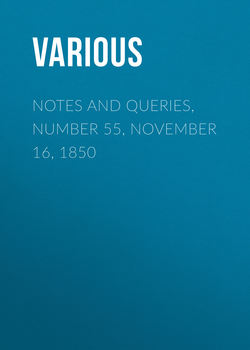Notes and Queries, Number 55, November 16, 1850

Реклама. ООО «ЛитРес», ИНН: 7719571260.
Оглавление
Various. Notes and Queries, Number 55, November 16, 1850
NOTES
AUTHORSHIP OF "HENRY VIII."
ON AUTHORS AND BOOKS, NO. IX
NOTES ON THE SECOND EDITION OF MR. CUNNINGHAM'S HANDBOOK OF LONDON
FOLK LORE
MINOR NOTES
QUERIES
DRYDEN'S "ABSALOM AND ACHITOPHEL."
MINOR QUERIES
REPLIES
THE BLACK ROOD OF SCOTLAND
REPLIES TO MINOR QUERIES
MISCELLANEOUS
NOTES ON BOOKS, SALES, CATALOGUES, ETC
BOOKS AND ODD VOLUMES WANTED TO PURCHASE
NOTICES TO CORRESPONDENTS
Отрывок из книги
In returning to the question of the authorship of Henry VIII., I am anxious to remove a misconception under which MR. SPEDDING appears to labour relative to the purport of a remark I made in my last communication to you (Vol. ii., p. 198.) on this subject. As we appear to be perfectly agreed as to the reasons for assigning a considerable portion of this play to Fletcher, and as upon this basis we have each worked out a result that so exactly coincides with the other, I conclude that MR. SPEDDING, as well as myself, has rested his theory solely on positive grounds; that is, that he imagines there is strong internal evidence in favour of all that he ascribes to this writer. It follows, therefore that the "third hand" which he thought he detected must be sought rather in what remained to Shakspeare, than in that which had been already taken from him. I never for an instant doubted that this was MR. SPEDDING's view; but the inequality which I supposed he had observed and accounted for in this way, I was disposed to refer to a mode of composition that must needs have been troublesome to Shakspeare. The fact is, that, with one or two exceptions, the scenes contributed by the latter are more tamely written than any but the earliest among his works; and these, different as they are, they recalled to my mind. But I have no doubt whatever that these scenes were all written about the same time; my feeling being, that after the opening Shakspeare ceased to feel any great interest in the work. Fletcher, on the other hand, would appear to have made a very great effort; and though some portions of the work I ascribe to him are tedious and overlaboured, no censure would weigh very strongly against the fact, that for more than two centuries they have been applauded as the work of Shakspeare.
As to the circumstances under which Henry VIII. was composed, it is an exceedingly difficult question; and if I venture, on the present occasion, to give the impression upon my mind, I do so, reserving to myself the full right to change my opinion whenever I shall have acquired more knowledge of the subject, or, from any other motive, shall see fit to do it. I consider this case, then, as one of joint authorship; in point of time not much later than the Two Noble Kinsmen, and in other respects similar to that play. If the conclusions of the article in the Westminster Review, to which MR. SPEDDING alludes, be accepted, the writer of the introductory notice to Henry VIII. in the Illustrated Shakspeare, published by Tyas, will recognise the "reverent disciple" whom he hints at, but does not name. In short, I think that Fletcher was the pupil of Shakspeare; and this view, it appears to me, demands the serious attention of the biographer who next may study or speculate upon the great poet's life.
.....
Before I conclude I am anxious to make an observation with regard to the extract from Mr. Emerson's Representative Men (vol. ii. p. 307.). The essay from which this is taken, I presume to be the same, in a printed form, as a lecture which I heard that gentleman deliver. With abundant powers to form a judgment for himself, I should say that his mind had never been directed to questions of this nature. Accident, perhaps, had drawn his attention to the style of Henry VIII.; but, with reference to the general subject, he had received implicitly and unquestioned the conclusions of authorities who have represented Shakspeare as the greatest borrower, plagiarist, and imitator that all time has brought forth. This, however, did not shake his faith in the poet's greatness; and to reconcile what to some would appear contradictory positions, he proposes the fact, I might say the truism, that the greatest man is not the most original, but the "most indebted" man. This, in the sense in which it is true, is saying no more than that the educated man is better than the savage; but, in the apologetic sense intended, it is equivalent to affirming that the greatest thief is the most respectable man. Confident in this morality, he assumes a previous play to Shakspeare's; but it appears to me that he relies too much upon the "cadence" of the lines: otherwise I could not account for his selecting as an "autograph" a scene that, to my mind, bears "unmistakeable traits" of Fletcher's hand, and that, by whomsoever written, is about the weakest in the whole play.
It is a branch of the subject which I have not yet fully considered; but MR. SPEDDING will observe that the view I take does not interfere with the supposition that Fletcher revised the play, with additions for its revival in 1613; a task for the performance of which he would probably have the consent of his early master.
.....